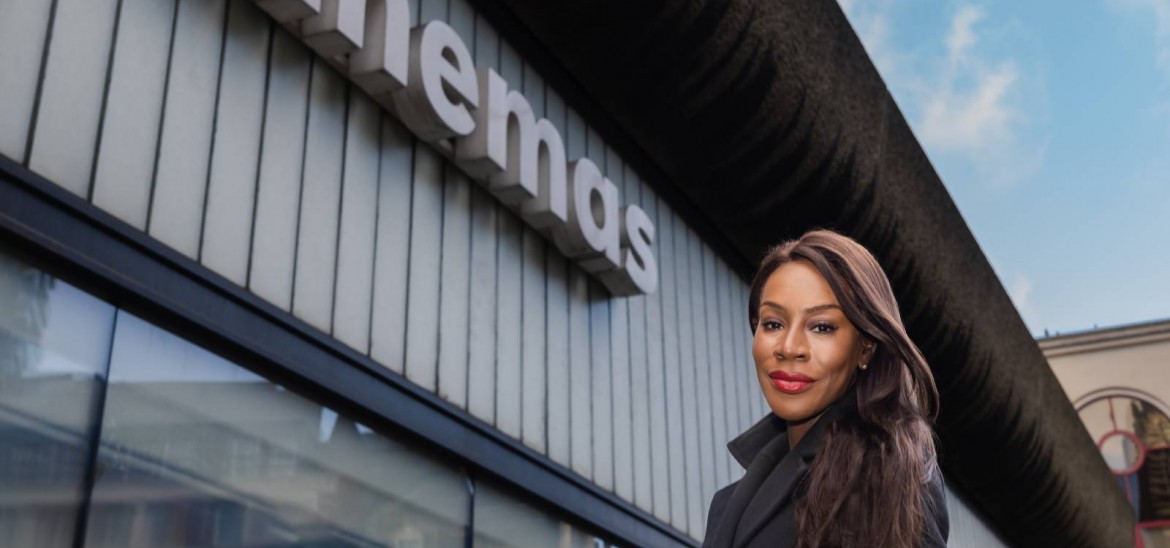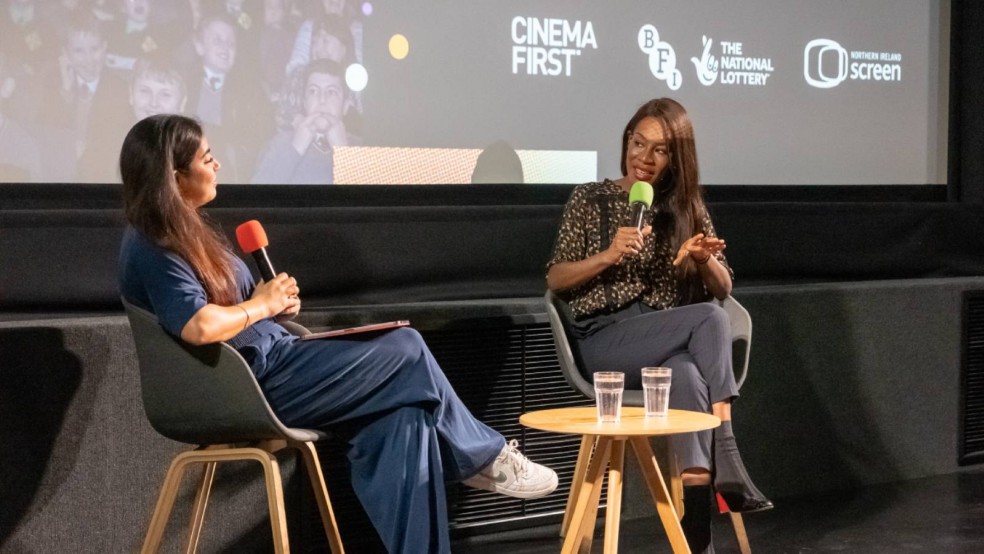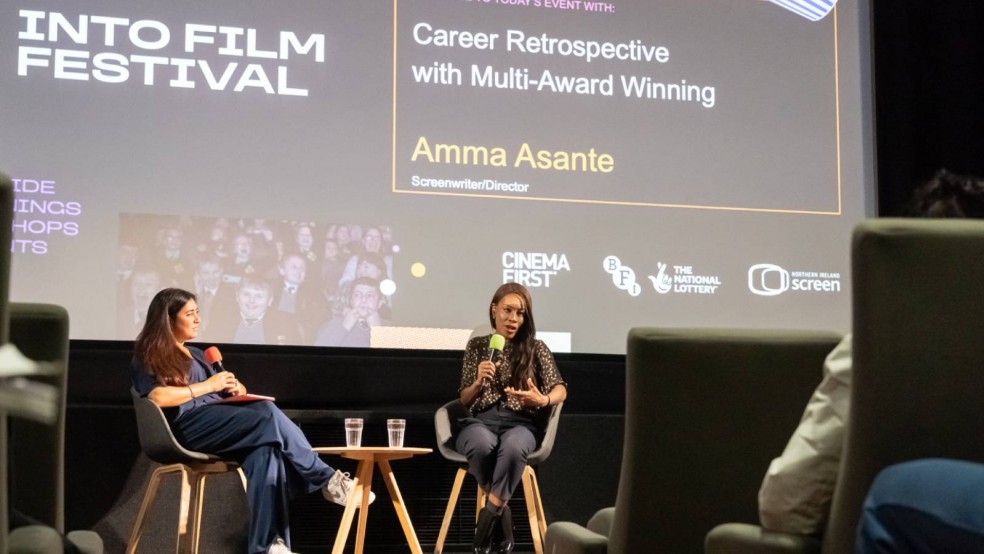Into Film Clubs
Find out everything you need to know about starting an Into Film Club.



We were honoured to have award-winning British director Amma Asante join us for a career retrospective as part of the Into Film Festival 2024. Asante - an Into Film Ambassador and patron of our careers programme - spoke to BBC radio film critic Rhianna Dhillon and a room of passionate young people in London about her game-changing career, and offered advice on how the next generation of British filmmaking talent can get started.
Director of films including Belle and A United Kingdom, as well as numerous TV credits, including The Handmaid's Tale, Asante is a pioneering director who strives to tell stories that nobody else will. As one of all-too-few Black female directors in the British film industry, her work often deals with intersecting issues around racism, sexism and class, and shines a light on little known stories, bringing untold experiences of Black people from throughout history to light.
"At the time I started making films, British film was very male, and very white", explained Asante. "The voices were different, but they were also the same. If any level of diversity wanted to have an input, the industry wasn't open to that, at the time. So I think I contributed to change through the outlook of film, and whom stories are told by; how we can open different and new windows onto subjects that we think we know, but perhaps have never seen through the eyes of a particular person before."

Asante's first film, A Way of Life, follows a teenage mother living in a dilapidated Cardiff council flat, and her frequent clashes with her neighbour, a Turkish Muslim immigrant. "You often end up with communities that are broken and that feel like they lack possibilities, and are fighting among themselves", explained Asante on what compelled her to write the film. "And that was something that I really wanted to focus on and explore. And we still have problems with that today. I wanted to look at the cause: what if racism wasn't a sickness, but was a symptom of the sickness? What if there was something underneath the racism, something deeper, that we could talk about and think about? And maybe if we did that, we'd be at the beginnings of finding a way to move forward in a healthy way. And that's why I made the film."
A Way of Life won Asante a BAFTA for Most Promising Newcomer in 2005, but it was over a decade before she made her follow-up feature, Belle, which depicts the true story of a mixed-race Black woman who found herself living at her father's court in England during the late 1700s.
"Belle is a costume drama. It looks like the kind of costume drama you've seen a thousand times before, but you've never seen it through the eyes of this lead, who happens to be a Black woman", Asante explained. "I think it's really important that we pulled the curtains off history, and reality, and who we think makes costume dramas - and who we think should be allowed to star in them. I think it was a watershed moment for how costume dramas looked - how they looked before Belle, and how they look after Belle - and I'm really proud of that."
I didn't think anyone was going to make this story, at that time. And that's why I did.
Amma Asante on 'Belle'
Asked about how long it takes to make a film and what it's like on set, Asante spoke about the importance of mental health and wellbeing. "There's this weird thing that happens when you're making films, and it's called 'life'. We often think about the end product, but for us as filmmakers, as crew, as cast, it's really important that we remember that making films is part of the process of our lives - and being miserable for 40 or 50 days for a great outcome is not good enough. We should be happy. And I think it's something that the industry is starting to take much, much more seriously."
Asante also spoke about the many varied roles in the film industry, from curation, to marketing, to graphic designers and cinematographers. "There is no job in the industry that doesn't contribute to our stories reaching an audience in the most effective way. This shouldn't be a world that's all about directors, or actors. It's important to shine a light on all the other areas that make a film come to life."
When Hands Touch is Asante's most recent film, and follows a mixed-race Black girl living in Nazi Germany during World War II. Asante recounted how, despite all she's achieved as a Black British female director, she still had to fight to make it. "While I've always experienced a very encouraging working environment, everyone thought it was too big for me", she recalled. "You know, 'It's a World War II movie, and women don't do that'. So I made A United Kingdom first, partly to prove that I could."
It's striking that even someone who has achieved as much as Asante can still come up against barriers like this, which only makes it even more crucial to keep encouraging a new generation of diverse filmmakers.
Taking questions from the audience, Asante was asked by one young person whether it was necessary to go to university to achieve a career in the screen industries. "It depends on you", was her response. "It's not necessary - but it can be useful. If I look back, do I wish I had gone to film school? Sometimes. But I'm also really proud I managed to do it by myself."
While reflecting on the value of going on to study film at further education, Asante also spoke about the value of making mistakes. "I'm envious of the students, who have the time to experiment. They get to learn that failure is part of the journey to success. You get to do things wrong! And there's something really wonderful about that." However, she went on to reinforce that for some it may be more beneficial to simply get started. "Making a film is a bit like learning to drive - you have to get on the road without your instructor at some point, and just face it by yourself."
While the Into Film Festival is a celebration of film and cinema as a whole, we also programme special events like these to provide inspiration for the next generation of filmmakers; to try and encourage more diverse voices and more vital stories to be told.
"It is an entirely different world for you guys than it was for me", Asante told the audience of teenagers. "I did it - I went through it. I went through tapping on those glass ceilings, and being in an environment where I was the only woman, or the only woman of colour… I did it - and so many of my generation did it - so that you don't have to. So that you can exist in an entirely different world. Doors that were not open for me, are absolutely open to you."
And if that isn't the message of the Into Film Festival, we don't know what is.

The Into Film Festival is possible thanks to the support of Cinema First and multiple partners across the cinema sector.
Viewing 4 of 4 related items.

Find out more about our streaming service, designed specifically for UK schools.